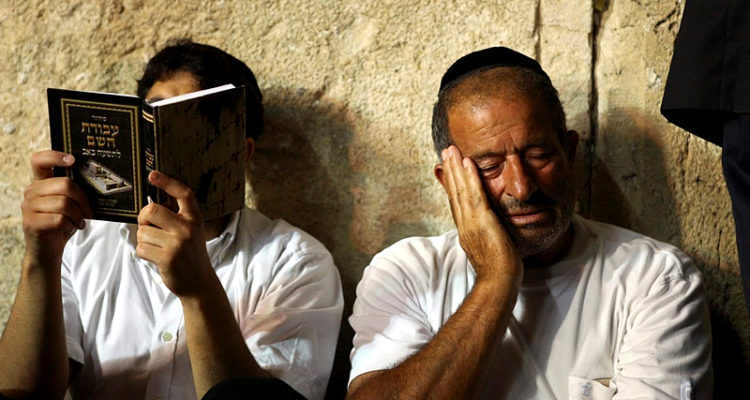On Tisha b’Av, the saddest day on the Jewish calendar, Jews mourn the First and Second Temples in Jerusalem that were destroyed, along with other tragedies suffered by the Jewish people on this day.
By: World Israel News Staff
This year Tisha b’Av, the ninth day of the Hebrew month of Av, fell on Shabbat. As per Jewish law, this day of mourning – which begins in the evening, as per the Jewish lunar calendar – began Saturday night and ends the next day at sunset.
On Saturday night, tens of thousands thronged the Western Wall to recite the Book of Lamentations. On Sunday, thousands ascended the Temple Mount. Several hundred people particiapated in the annual march around the Old City, organized by Women for Israel’s Tomorrow, popularly known as Women in Green, a non-profit “dedicated to safeguarding our God-given biblical homeland.”
The Jewish sages teach that the ninth day of Av is a cursed day that is eternally destined for bad luck and tragedy, but that in future, with the rebuilding of the Holy Temple, it will be a day of celebration.
Tisha b’Av tragedies
The First Crusade began on the ninth of Av, corresponding to August 15, 1096. Over 1.2 million Jews were killed.
The Jews were expelled from England on the ninth of Av, corresponding to July 18, 1290.
The Jews were expelled from France on the ninth of Av, corresponding to July 22, 1306.
The Jews were expelled from Spain on the ninth of Av, corresponding to July 31, 1492.
Germany entered World War One on the ninth of Av, corresponding to August 1, 1914.
SS commander Heinrich Himmler formally received approval from the Nazi Party for “The Final Solution” on the ninth of Av, corresponding to August 2, 1941.
The deportation of the Jews of the Warsaw Ghetto, most of whom were taken to be gassed in Treblinka, took place on the ninth of Av, corresponding to July 23, 1942.
Symbols of mourning
The restrictions of Tisha b’Av are similar to those of Yom Kippur. During the course of Tisha b’Av, the following activities are forbidden:
No eating or drinking;
No washing or bathing;
No application of creams or oils;
No wearing of (leather) shoes;
No marital relations.
Of course, those who are ill are permitted to eat, as needed. Another prominent feature of Tisha b’Av is the reading of the Book of Lamentations, along with the recitation of ancient dirges that take place in the synagogue while worshippers are seated on the floor.





